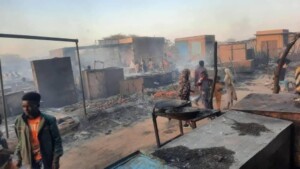Human rights lawyer: ‘Internet blackout hides Sudan coup atrocities’
The ongoing internet shut-down and disruptions to telecommunications in Sudan have entered their eighth day. Critics and activists caution that the blackout is being used as a smokescreen to hide atrocities committed by the army and paramilitary forces in support of the military coup.
 File photo
File photo
The ongoing internet shut-down and disruptions to telecommunications in Sudan have entered their eighth day. Critics and activists caution that the blackout is being used as a smokescreen to hide atrocities committed by the army and paramilitary forces in support of the military coup.
Reports from the capital Khartoum and other cities in the country indicate that little internet traffic is possible, while mobile phone services are intermittent and unreliable.
Human rights defender Ali Ajab told Radio Dabanga that “cutting off the internet aims to hide the crimes of the Sudan Armed Forces and Rapid Support Forces,” and that if the internet service is restored, “the world will witness the extent of the atrocities committed by these forces against peaceful and defenceless demonstrators”.
He told Radio Dabanga that Lt Gen Abdelfattah El Burhan, leader of the military coup that took place on October 25, has “restored the operations department of the security apparatus specialised in detentions and torture”.
The lawyer said that the wide detention campaign against pro-democracy politicians, members of Resistance Committees, and other activists, is carried out by several parties, such as the Military Intelligence that takes detainees to military sites, and the security apparatus, which uses its old headquarters in Khartoum North near the Shendi bus station – though the amended Security Service Law does not give the General Intelligence Service (GIS) the authority to detain people.
Ajab further reported that the civil disobedience actions are “working efficiently. Almost all neighbourhood grocers are working to meet the needs of the people.”











 and then
and then